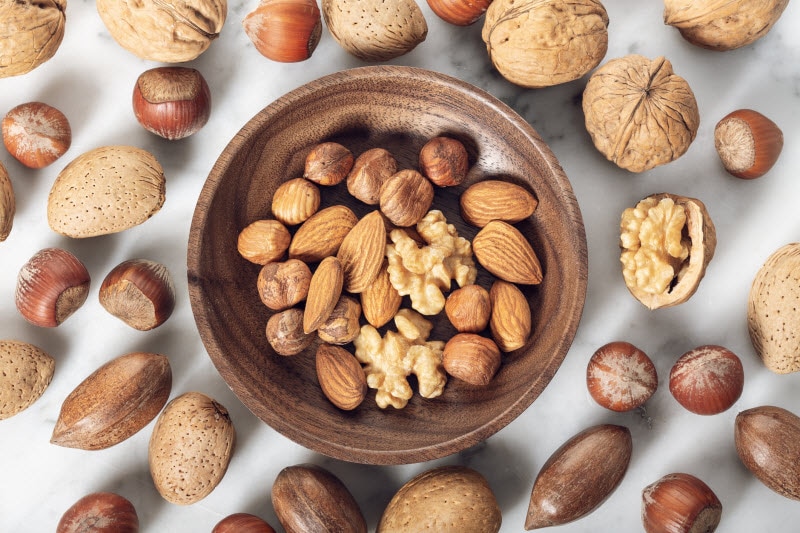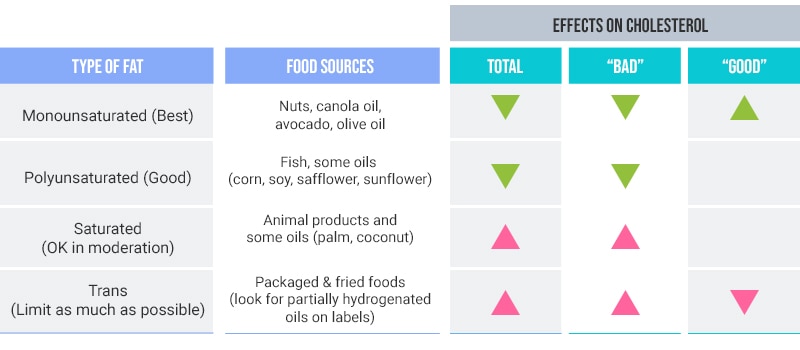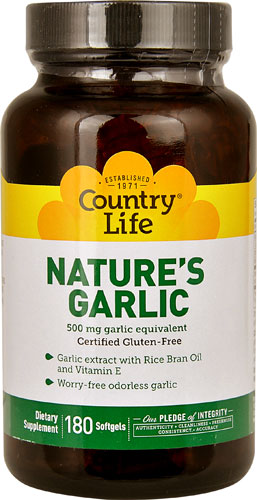Diet can play an important role in lowering your cholesterol -- specifically, low-density lipoprotein (LDL) cholesterol, which is also known as “bad cholesterol.” In contrast to what many believe, the biggest influence on blood
cholesterol levels is the mix of fats and carbohydrates in your diet—not the amount of cholesterol you eat from food. Here is what to focus on when working to lower LDL cholesterol through diet.

Foods to avoid to lower cholesterol
Saturated fat is found in fatty meats, poultry skin, bacon, sausage, whole milk, cream, butter and other animal products. Aim to eat 7% or less of the day’s total calories from saturated fat. That means 14 grams or less per day if you consume 2,000 calories per day.
Trans fats are found in processed foods such as cookies, chips, cakes and fried foods. If you notice that a product has “partially hydrogenated oils” in the ingredients list, it likely has trans fat, even if it states 0 grams trans fat on the nutrition facts panel. A manufacturer can claim 0 grams trans fat if the product has less than or equal to 0.5 grams of trans fat per serving.
Foods to eat to lower cholesterol
Eat more omega-3 fats (a type of heart-healthy polyunsaturated fat)
Alpha Linolenic Acid (ALA) is found in canola and soybean oil,
walnuts and
flaxseed. The flaxseed must be ground or cracked for ALA to be absorbed.
EPA and DHA are found in fatty fish, such as salmon, mackerel, tuna, and sardines. These omega-3 fats are the most heart healthy. Aim for two 4-ounce servings of fatty fish per week.
Fish oil supplements: if you do not eat fish, it is recommended that you get 1 gram of EPA and DHA combined per day from
fish oil supplements.
The following chart explains the different types of fat and their effect on cholesterol levels. You can use this as a cheat sheet when selecting which types of fat to include in your diet.
The Impacts of Different Types of Fats on Cholesterol
 Eat more fiber
Eat more fiber
There are two
types of fiber: soluble and insoluble. Soluble fiber is responsible for the cholesterol-lowering effects of fiber.
Aim to eat 25 to 30 grams of
fiber each day. Be sure to increase your fiber intake slowly and to drink plenty of fluids in order to avoid gas and bloating.
Fruits, vegetables, whole grains and dried beans are great
sources of fiber. Vegetables with lots of soluble fiber include broccoli, Brussels sprouts, acorn squash, lima beans, okra and eggplant.
Increase fiber intake by mixing ground flaxseed,
oat bran or
rice bran into cereal and muffins.
When eating to lower your cholesterol, it is often helpful to think about what to
add to your diet rather on what to remove. Focus on adding in plenty of healthy fats, fruits, vegetables, whole grains and lean proteins and be prepared to see an improvement over time!





